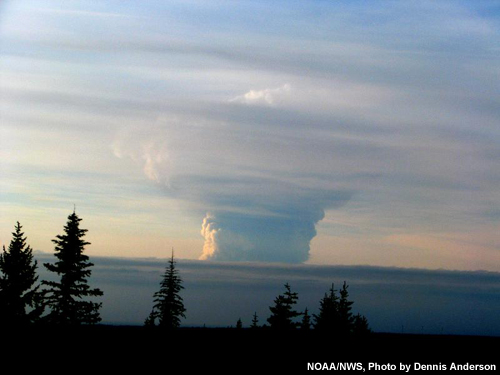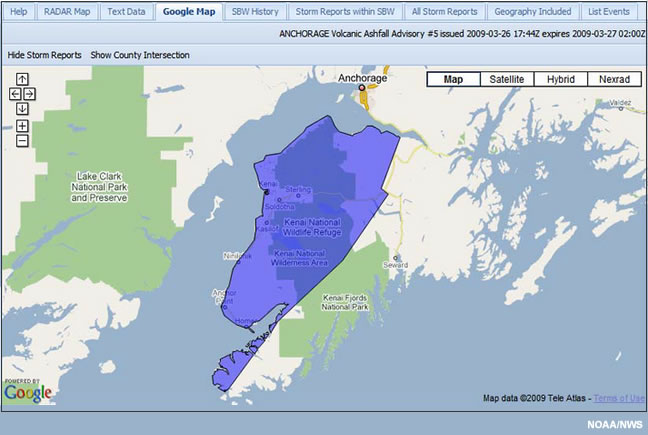Redoubt Volcano
Table of Contents
Introduction
What about events affecting aviation that are more difficult to predict? On March 22, 2009, Mount Redoubt volcano, 106 miles southwest of Anchorage, Alaska, began a series of eruptions.

Let’s follow some of the key occurrences during this event to see how the aviation forecasting entities got the most useful and timely information to their users.
Identify and Communicate the Threat
Here is a listing of the Mount Redoubt eruptions from March 22-March 26, 2009, along with information on the flight levels impacted by the ash plume.
Timeline for Preliminary Eruption Events:
Date Time (AKDT) Flight Level
Mar 22 22:38 FL180
Mar 22 23:02 FL440
Mar 23 00:14 FL430
Mar 23 01:39 FL430
Mar 23 04:31 FL490
Mar 23 19:41 FL600
Mar 26 08:34 FL220
Mar 26 09:24 FL620
Question 1
Review the events above. What hazards do forecasters need to communicate to the Tower, TRACON, and TMU? (Choose all that apply.)
The correct answers are a), b), and d).
Aircraft damage, low visibility, and ashfall on the airport are hazards that need to be communicated immediately to all aviation interests in the area. While pilots do their best to avoid ash clouds, such clouds could prevent pilots from identifying the presence of other aircraft in the vicinity. Thus answer c) is incorrect. For more information about the impacts of volcanic ash on aviation, see Volcanic Ash: Impacts to Aviation, Climate, Maritime Operations, and Society on MetEd.
Question 2
With whom should CWSU personnel coordinate to ensure a consistent message for aviation users? (Choose the best answer.)
The correct answer is e).
In this situation, the CWSU needs to coordinate and communicate with all the entities mentioned above. During this event, the CWSU coordinated with the FAA to make them aware of SIGMET-advised ash areas and to get PIREP information to aviation users. The Weather Forecast Office opened a special volcano desk, issued Ashfall Advisories (including forecast ash amount and forecast confidence levels) hosted daily coordination calls, and collaborated with the Alaska Volcano Observatory (AVO) on a one-stop coordination webpage for information. During the Redoubt event, both the CWSU and WFO made extensive use of NWSChat.
Understand User Needs
The following is an Ash Advisory issued during the event. Review it and answer the question below.

URGENT - WEATHER MESSAGE
NATIONAL WEATHER SERVICE ANCHORAGE AK
944 AM AKDT THU MAR 26 2009
"MOUNT REDOUBT HAS ERUPTED MULTIPLE TIMES THIS MORNING.THE MOST
SIGNIFICANT ERUPTION OCCURRED AROUND 924 AM WITH A PLUME RISING
UP TO 60000 FEET. ASH FROM THESE ERUPTIONS WILL TRACK TO THE
KENAI PENINSULA WITH ESTIMATED ARRIVAL OF ASH BETWEEN NOON AND
2 PM. MINOR ASHFALL IS LIKELY FROM NINILCHIK SOUTHWARD TO THE
SOUTHERN TIP OF THE KENAI PENINSULA...INCLUDING HOMER AND
COMMUNITIES ALONG KACHEMAK BAY.A TRACE TO ONE EIGHTH OF AN INCH
OF ASH MAY ACCUMULATE THIS AFTERNOON. TRACE AMOUNTS OF ASH ARE
ALSO POSSIBLE FOR AREAS NORTH OF NINILCHIK."
Question
Based on this advisory, what concerns are likely for the FAA and airlines? (Choose the best answer.)
The correct answer is e).
The ash advisory will prompt immediate mitigation by the airlines. On March 23, Alaska Airlines canceled 19 flights in and out of Anchorage International Airport. Elmendorf Air Force Base sheltered 60 planes, including fighter jets, cargo aircraft, and a 747 commercial plane.
Anticipate the Impacts
Question
In all, 18 eruptions occurred between March 22 and March 28, and a nineteenth eruption occurred on April 4. What would be the likely impacts to aviation interests during this period? (Choose all that apply.)
The correct answer are b), c), d) and e).
Overall, flight levels impacted by the ash plume ranged from FL170 to FL620. Ashfall resulted in Elmendorf Air Force Base relocating some of its assets. During the worst of the ashfall, Anchorage International Airport, an important hub for cargo between Asia and the U.S., was closed for 20 consecutive hours. Hundreds of commercial flights were cancelled and FedEx, UPS, and other cargo carriers rerouted aircraft to Seattle. The impact on Alaskan air freight from this event was estimated at approximately $20 million per day.
Although the impacts to the aviation industry were significant, most airline operators agreed that the losses would have been higher without timely and accurate NWS products and services. For instance, damage to a single 747 encountering an ash cloud following the 1990 Redoubt eruption totaled $80 million after all four engines shut down mid-flight. In that case, the crew and passengers were lucky as the engines restarted and the plane landed safely in Anchorage.